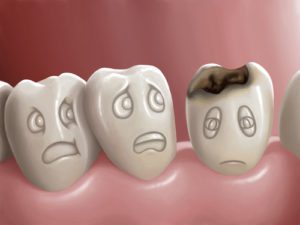 It is common knowledge that brushing your teeth, flossing daily, and maintaining your dental hygiene appointments will help keep cavities at bay. However, many people, despite their best efforts, may actually be more prone to cavities than those who slack on their oral hygiene. Why all the unfairness?
It is common knowledge that brushing your teeth, flossing daily, and maintaining your dental hygiene appointments will help keep cavities at bay. However, many people, despite their best efforts, may actually be more prone to cavities than those who slack on their oral hygiene. Why all the unfairness?
The True Cause of Cavities
There is no scientific proof to support the claim that regular brushing and flossing will prevent cavities. Tooth decay can be attributed to two things: the consumption of sugar and genetics.
Sugar
Cavities cannot exist without sugar. Bacteria in our mouths feast on sucrose (the chief component of sugar). The bacteria multiply and thrive between our teeth, causing decay in the process, which is more likely to occur if you have existing holes, small cracks, or deep crevices in your teeth. This fact brings us to our second cavity culprit and the answer to our main question: Am I prone to cavities?
Genetics
Some people naturally have deeper crevices in their teeth than others, which creates a more comfortable place for bacteria to burrow into the tooth and cause a cavity. This can be helped with the use of sealant, which Dr. Sands can apply to the grooves of your teeth to provide a protective layer.
You might also be more prone to cavities if you do not produce much saliva. Your saliva contains bicarbonate, calcium, and phosphate, which help repair early tooth decay and neutralize acid that causes plaque. Certain medications can cause your saliva production to dwindle. Smoking, stress, aging, chemotherapy, and autoimmune disorders can also lead to dry mouth, or “cotton mouth.” Your doctor can help you find ways to increase your production of saliva if drinking more water throughout the day does not help.
How Can I Prevent Cavities?
Although brushing and flossing daily is not proven to completely prevent cavities, it can decrease them by up to 20 percent if you use toothpaste that contains fluoride. Reducing your intake of sugar and carbohydrates (which convert into sugar in the mouth) will also significantly reduce your chances of getting a cavity. If the damage is already done, Dr. Sands can repair your cavities with dental bonding.
If you would like Dr. Kevin Sands to help maintain the health and beauty of your smile, please schedule your appointment today by calling (310) 273-0111. You can also fill out our online contact form at your convenience.